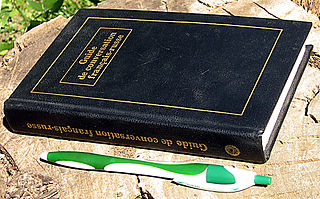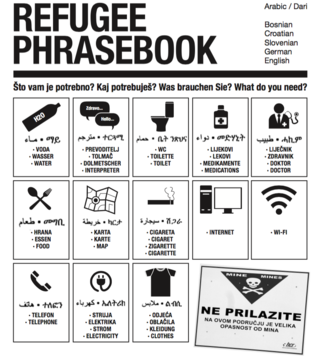In linguistics, a copula /‘kɒpjələ/ is a word or phrase that links the subject of a sentence to a subject complement, such as the word is in the sentence "The sky is blue" or the phrase was not being in the sentence "It was not being cooperative." The word copula derives from the Latin noun for a "link" or "tie" that connects two different things.
English grammar is the set of structural rules of the English language. This includes the structure of words, phrases, clauses, sentences, and whole texts.
A noun phrase – or NP or nominal (phrase) – is a phrase that usually has a noun or pronoun as its head, and has the same grammatical functions as a noun. Noun phrases are very common cross-linguistically, and they may be the most frequently occurring phrase type.

Sir Dirk Bogarde was an English actor, novelist and screenwriter. Initially a matinée idol in films such as Doctor in the House (1954) for the Rank Organisation, he later acted in art house films, evolving from "heartthrob to icon of edginess".
In linguistics, a nonce word—also called an occasionalism—is any word (lexeme), or any sequence of sounds or letters, created for a single occasion or utterance but not otherwise understood or recognized as a word in a given language. Nonce words have a variety of functions and are most commonly used for humor, poetry, children's literature, linguistic experiments, psychological studies, and medical diagnoses, or they arise by accident.
In linguistics, word order is the order of the syntactic constituents of a language. Word order typology studies it from a cross-linguistic perspective, and examines how languages employ different orders. Correlations between orders found in different syntactic sub-domains are also of interest. The primary word orders that are of interest are

O novo guia da conversação em portuguez e inglez, commonly known by the name English as She Is Spoke, is a 19th-century book written by Pedro Carolino, with some editions crediting José da Fonseca as a co-author. It was intended as a Portuguese–English conversational guide or phrase book. However, because the provided translations are usually inaccurate or unidiomatic, it is regarded as a classic source of unintentional humour in translation.

David Crystal, is a British linguist who works on the linguistics of the English language.

In English, the passive voice is marked by a subject that is followed by a stative verb complemented by a past participle. For example:
The enemy was defeated. Caesar was stabbed.

A phrase book or phrasebook is a collection of ready-made phrases, usually for a foreign language along with a translation, indexed and often in the form of questions and answers.
In linguistics, intonation is the variation in pitch used to indicate the speaker's attitudes and emotions, to highlight or focus an expression, to signal the illocutionary act performed by a sentence, or to regulate the flow of discourse. For example, the English question "Does Maria speak Spanish or French?" is interpreted as a yes-or-no question when it is uttered with a single rising intonation contour, but is interpreted as an alternative question when uttered with a rising contour on "Spanish" and a falling contour on "French". Although intonation is primarily a matter of pitch variation, its effects almost always work hand-in-hand with other prosodic features. Intonation is distinct from tone, the phenomenon where pitch is used to distinguish words or to mark grammatical features.

A postilion or postillion is a person who rides a harnessed horse that is pulling a horse-drawn vehicle such as a coach, rather than driving from behind as a coachman does. This method is used for pulling wheeled vehicles that do not have a driver's seat, such as many ceremonial state coaches and artillery limbers and caissons. Postilion riders are generally arranged one rider for each pair of horses, riding the left horse.
In linguistic typology, a verb–subject–object (VSO) language has its most typical sentences arrange their elements in that order, as in Ate Sam oranges. VSO is the third-most common word order among the world's languages, after SOV and SVO.
"Dirty Hungarian Phrasebook" is a Monty Python sketch. It first aired in 1970 on Monty Python's Flying Circus as part of Episode 25, and also appears in the film And Now for Something Completely Different. Atlas Obscura has noted that it may have been inspired by English as She Is Spoke, a 19th-century Portuguese–English phrase book regarded as a classic source of unintentional humour, as the given English translations are generally completely incoherent.
The exclamation mark! is a punctuation mark usually used after an interjection or exclamation to indicate strong feelings or to show emphasis. The exclamation mark often marks the end of a sentence, for example: "Watch out!". Similarly, a bare exclamation mark is often used in warning signs. The exclamation mark is often used in writing to make a character seem as though they are shouting, excited, or surprised.

Malagasy is an Austronesian language and dialect continuum spoken in Madagascar. The standard variety, called Official Malagasy, is an official language of Madagascar alongside French.
La plume de ma tante is a phrase in popular culture, attributed to elementary French language instruction and used as an example of grammatically correct phrases with limited practical application that are sometimes taught in introductory foreign language texts. As Life magazine said in 1958, "As every student knows, the most idiotically useless phrase in a beginner's French textbook is la plume de ma tante ." The phrase is also used to refer to something deemed completely irrelevant. The term lent its name to the musical play La Plume de Ma Tante, which won a Tony Award in 1959.

I Cannot Eat Glass was a linguistic project documented on the early Web by then-Harvard student Ethan Mollick. The objective was to provide speakers with translations of the phrase "I can eat glass, it does not hurt me" from a wide variety of languages; the phrase was chosen because of its unorthodox nature. Mollick's original page disappeared in or about June 2004, but the phrase has continued as an absurdist example in linguistics. The project is housed on the current website for The Immediate Gratification Players, a student improvisational comedy group of which Mollick was a member and which hosted the original site.
Jack Francis Needham OBE (1842–1924) was a British officer in the Bengal Police who was posted in the Eastern Himalayan region during the late 19th and early 20th centuries. He authored several pioneering descriptions of Sino-Tibetan and Tai-Kadai languages in the area.

Refugee Phrasebook is an online collection of useful vocabulary and phrases for refugees who have recently arrived in various European and potentially other host countries. Published as open source software, it is a multilingual tool that provides basic useful vocabulary related to the most common immediate needs of refugees and their helpers. As of early 2022, it provides phrases in more than 28 languages, including Arabic, Persian, Turkish, Dari, Bosnian, Albanian, English, German, Hungarian and others. In order to support refugees having to communicate in new linguistic situations, everyone is free to adapt, print and distribute pairs of translated important phrases in basic everyday situations.









